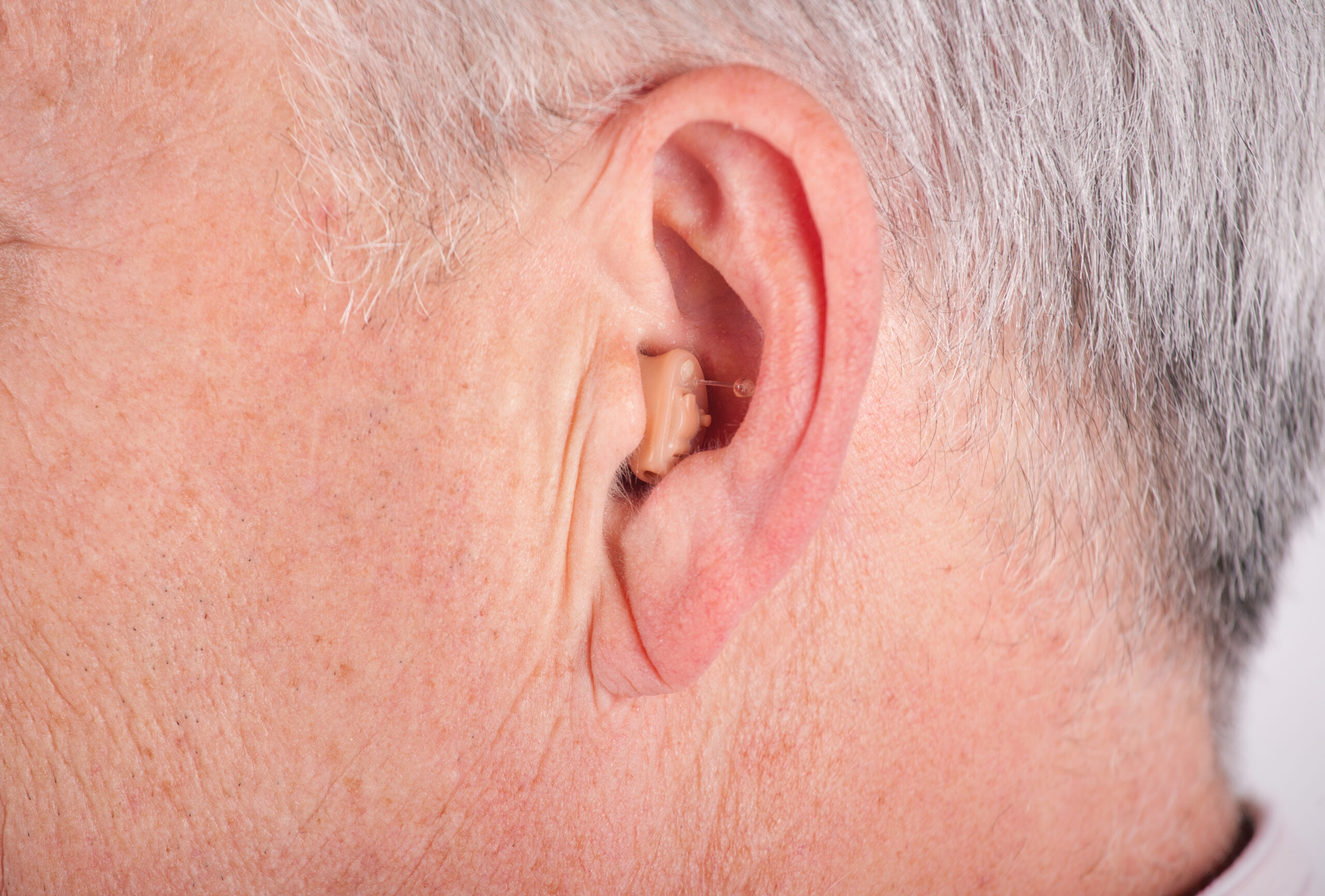How Hearing Aids Can Mitigate Cognitive Decline & Memory Loss

Maintaining good cognitive health is crucial for leading a fulfilling life in today’s fast-paced world, where technology and information overload have become the norm. Cognitive decline and memory loss are common concerns associated with aging.
However, recent research has shed light on an unexpected connection between hearing loss and cognitive decline. At Ace Audiology, we believe in empowering individuals to take charge of their cognitive well-being. In this blog post, we explore the fascinating link between hearing aids and the mitigation of cognitive decline and memory loss.
An article published in the Lancet of 18 July 2023, looking at 3 year cognitive changes in aided and unaided groups, indicated a 48% reduction in 3 year cognitive decline in the Atherosclerotic Risk in Communities (ARIC) cohort with hearing intervention compared to controls.
The Importance of Hearing Aids In Combatting Cognitive Decline
Hearing aids, with their advanced technology and innovative features, have revolutionised the way we address hearing loss. These remarkable devices enhance speech comprehension, improve auditory input, and provide individuals with a renewed sense of hearing.
By wearing a hearing aid, individuals can regain their ability to actively participate in conversations and engage with their surroundings. Also, the use of a hearing aid reduces the cognitive load associated with untreated hearing loss, allowing individuals to preserve cognitive function and potentially prevent or slow down cognitive decline.
With the assistance of a hearing aid, individuals can enjoy a better quality of life and maintain their cognitive well-being. At Ace Audiology, we are committed to providing comprehensive hearing solutions and supporting individuals on their journey to better hearing health through the use of hearing aids.
The Connection Between Cognitive Function and Hearing Loss
While hearing loss and cognitive decline were once considered unrelated issues, numerous studies have now revealed their interdependence. The brain relies on auditory input to process and understand speech, and when hearing loss occurs, this input is compromised.
Due to there being a strong connection between cognitive function and hearing loss, people with hearing loss can be at an increased risk of developing cognitive impairment, such as dementia, which includes Alzheimer’s disease. This connection is rooted in the various changes that hearing loss can influence within the brain.
These changes can include:
- Mild hearing loss
- Developing mild cognitive impairment
- Social isolation
- Poorer physical health
- Self reported listening disability
Hearing Loss and Cognitive Decline Of An Elderly Parent: What You Need to Know
Hearing loss has been thought to be one of the larger contributors for the development of dementia. Although there has been some further groundbreaking research and insight where a study published in The Lancet on July 18, 2023, found that people with hearing loss who wore hearing aids for 3 years, experienced a 48% reduction in cognitive decline compared to those who did not wear hearing aids.
The positive impact of hearing aids on cognitive decline could be attributed to several factors:
- Improved sensory input
- Social engagement
- Brain plasticity

The Significant Difference In Hearing Aid Users
At our hearing aid clinic, we understand the specific ways in which hearing aids can significantly enhance cognitive function and combat the effects of cognitive decline. By effectively addressing hearing loss and improving auditory input, our advanced hearing aids enhance speech comprehension, allowing individuals to actively participate in conversations and grasp instructions with ease.
By reducing the cognitive load associated with untreated hearing loss, our hearing aids enable individuals to allocate cognitive resources to important tasks such as memory recall, comprehension, and higher-order cognitive functions.
Is There A Significant Improvement?
There is a significant difference between hearing aid users and individuals who are not using hearing aids in terms of cognitive impairment. Studies have shown that untreated hearing loss is associated with a higher risk of cognitive decline and impairment. Whereas individuals who do use hearing aids to address their hearing loss, experience several advantages in cognitive function.
Hearing aid users demonstrate improved speech comprehension which allows them to actively engage in conversations and follow instructions effectively. By reducing the cognitive load associated with untreated hearing loss, hearing aids help individuals preserve cognitive function and potentially slow down cognitive decline.
In contrast, individuals with untreated hearing loss may experience difficulties in memory, processing information quickly, and overall cognitive performance. By addressing hearing loss with hearing aids, individuals can bridge the gap and experience better cognitive function compared to those without hearing aid support.
What Can Cognitive Decline Look Like With Untreated Hearing Loss?
With untreated hearing loss, whether it’s age related hearing loss or not, cognitive decline and brain health can often be exhibited in many different ways. The severity of cognitive decline can vary from person to person, so not everyone with self-reported hearing loss will experience the same degree of cognitive impairment. While some adults may only be in the early stages of mild cognitive impairment and be of somewhat normal hearing, when left untreated, it can increase the risk factors of accelerated cognitive decline.
Below are some common signs of cognitive decline that elderly adults or adults may encounter when hearing loss is left untreated.
Cognitive Function and Memory Difficulties
Untreated hearing loss can lead to mild cognitive impairment and a decline in brain health and quality of life. People with hearing impairment may have difficulty remembering what was said in conversations, following instructions, or recalling details of recent events. They may also forget important appointments or struggle to retain new information. This can lead to social isolation, depression, and a decrease in overall well-being.
Slow Working Memory Speed
Hearing loss can impair cognitive ability and lead to poorer cognitive outcomes. This is because hearing impairment can make it difficult to process information quickly, which can lead to slower reaction times in conversations and other situations that require quick thinking. When hearing loss is left untreated without the use of hearing aids, symptoms of accelerated cognitive decline in cognitive performance may be displayed.
Vast Decline In Cognitive Function Overtime
If hearing loss is left untreated, the effects of cognitive decline will impact the overall cognitive abilities and function of the person. Those at risk of dementia may see a more rapid decline in cognitive function such as the ability to plan, organise, problem-solve and remember crucial memories.

The Role of Hearing Aids in Mitigating Cognitive Decline and Memory Loss
The role of hearing aids in mitigating cognitive decline and memory loss is increasingly recognised as crucial in maintaining overall cognitive health. Hearing loss has been linked to an increased risk of cognitive impairment, including memory decline and other cognitive difficulties.
However, wearing hearing aids can be a revolutionary benefit to those experiencing impairment. By addressing hearing loss and improving auditory input, hearing aids alleviate the cognitive impairment placed on the brain by:
- Enhance speech comprehension
- Allowing individuals to actively engage in conversations
- Understand instructions
- Process information effectively
- Improve cognitive function
The use of hearing aids reduces the cognitive load associated with untreated hearing loss, freeing up cognitive resources for other important cognitive function such as:
- Memory recall
- Comprehension
- Higher-order cognitive tasks
- Social interaction and engagement, which provide essential cognitive stimulation
By enabling individuals to stay connected with their environment and maintain cognitive skills, hearing aids play a vital role in preserving cognitive function and mitigating the impact of cognitive decline and memory loss. Embracing the benefits of hearing aids can empower individuals to lead more fulfilling lives and protect their cognitive abilities and overall well-being.
Contact Our Hearing Aid Consultants Today
If you or a loved one are trying to mitigate hearing loss and cognitive function, then don’t hesitate to reach out to ACE Audiology today. After a thorough cognitive health evaluation, our dedicated team of professionals will guide you through personalised hearing aid consultations, ensuring you receive the optimal solution for your hearing needs, with an aim to make you feel a clinically significant improvement in both your hearing impairment and cognitive health.
If you are concerned about your hearing health, please schedule a consultation with an audiologist at ACE Audiology today. We would be happy to answer any questions you have and help you find the best solution for your needs.
